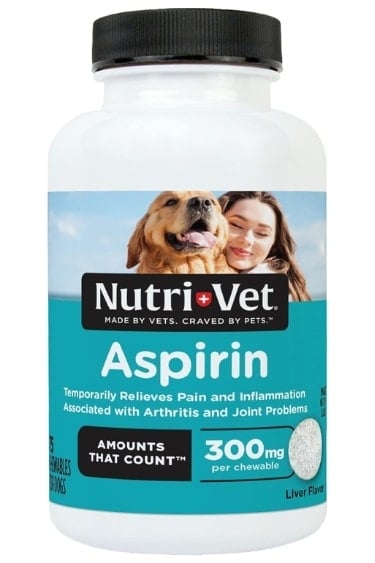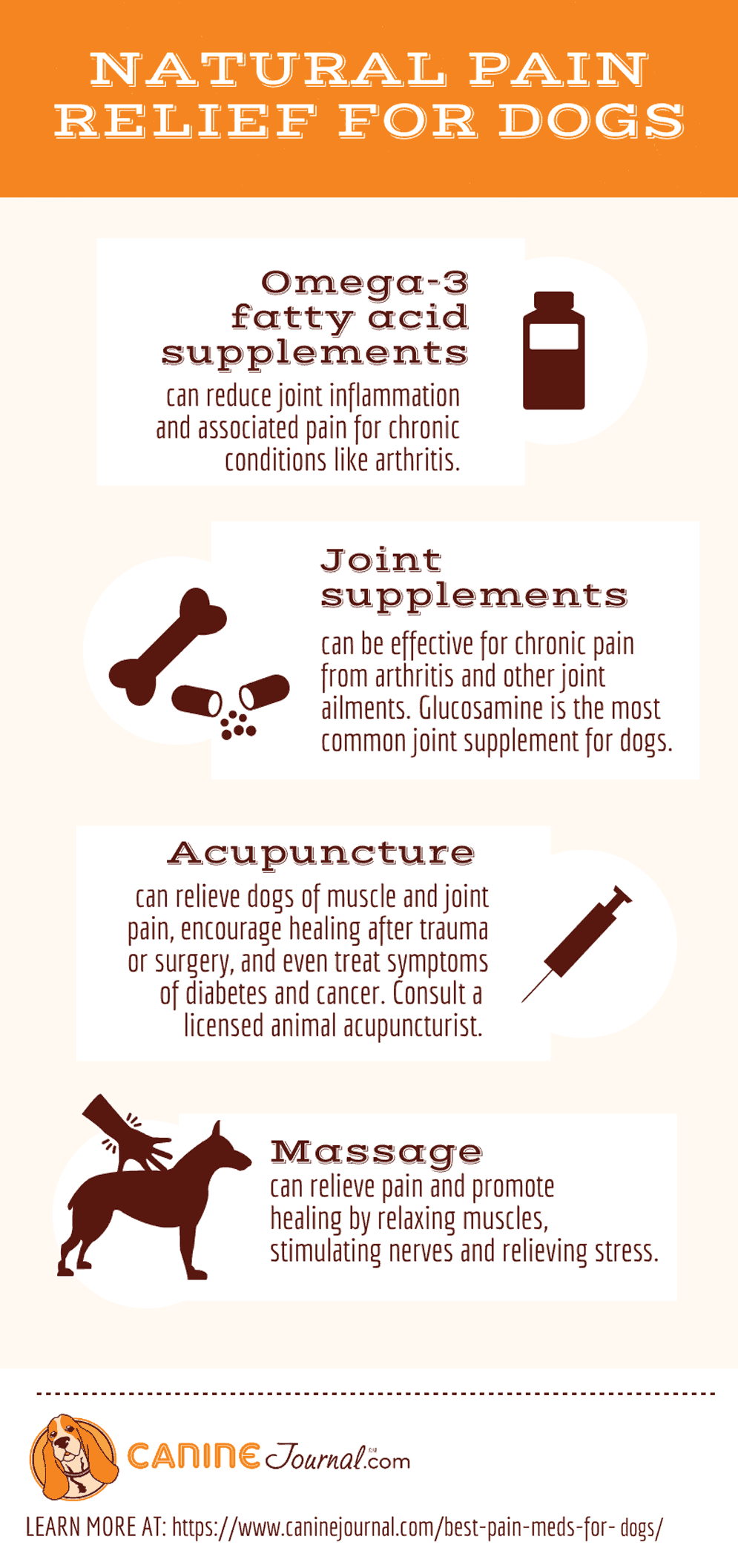This content was reviewed by veterinarian Dr. Elizabeth Racine, DVM.
When you purchase through links on our site, we may earn a commission. Here’s how it works.

Our family dog, Tiny, is a fanatic off-leash runner. He loves to bolt at full speed, but his aging body isn’t keeping up with his youthful energy (sound familiar?!). Often, the next day, he’s sluggish and so sore he won’t even jump up on the couch with me.
We all hate to see our dogs in pain and want to give them relief. Fortunately, there are some very effective pain medications for dogs available. Before you pop them a pill, however, it’s crucial to know what’s safe and what’s not — and what pain medication side effects to watch for.
Are Human Pain Meds For Dogs Safe?
Many human pain meds are not safe for dogs. You might be tempted to save yourself time and money by just giving your pup one of your over-the-counter pain meds. Think again. Of course, you want to help your pup when they are hurting, but what painkillers are safe for dogs?
Human medications and over-the-counter (OTC) pain meds for dogs can be extremely dangerous and even fatal. Learn more about OTC meds for dogs.
Can Dogs Have Ibuprofen?
Experts warn to never give your dog ibuprofen (Advil, Motrin) or naproxen (Aleve). These two OTC pain relievers are highly toxic to dogs, and even one tablet can cause severe side effects in dogs or even death.
Can Dogs Have Aspirin?
Buffered aspirin isn’t quite as risky for all dogs, but it’s imperative to only give your pup aspirin under your vet’s direction. Why? Some dogs can have serious side effects from aspirin. Symptoms can include vomiting, diarrhea, loss of appetite, kidney issues, and even hemorrhage.
Can I Give My Dog Baby Aspirin For Pain?
Generally speaking, no. It might seem like a milder medication, like baby aspirin, should be safe for dogs. You may even be tempted to give it to your dog if you notice them limping or in pain. As a general rule, you should only give baby aspirin to your pup if your vet directs it. It’s better to stick to aspirin formulated for canines to have.
All of these medications fall under the class of non-steroidal anti-inflammatory drugs (NSAIDs). They work by inhibiting the production of fatty acid compounds in your body called prostaglandins, which are responsible for fever, inflammation, and pain. The most common nonsteroidal anti-inflammatory drugs we humans use are ibuprofen, aspirin, and naproxen sodium.
Prostaglandins, however, serve beneficial roles in human and canine bodies. They sustain sufficient blood flow to the kidneys, maintain normal blood clotting, and produce a layer of mucus that protects the gastrointestinal tract’s inner lining from stomach acid.
When these healthy functions become reduced, dogs are particularly susceptible to health problems. They can develop:
- Vomiting and diarrhea (often bloody)
- Intestinal problems
- Loss of appetite
- Bleeding disorders
- Kidney or liver dysfunction or even failure
Can Dogs Take Tylenol?
Tylenol for dogs is another huge NO — unless it’s prescribed by your veterinarian. Tylenol is acetaminophen, not an NSAID, but tests have shown that it’s equally as harmful to dogs when given in human doses.
When dogs ingest even a slight overdose of acetaminophen, it can destroy their liver cells and damage their kidneys and other tissues all over their body. Cats are severely sensitive to acetaminophen — so much so that just one tablet can be fatal.
Can I Give My Dog Benadryl For Pain?

While dogs can safely take Benadryl, it will not help relieve pain. While considered safe for most dogs, Benadryl has no pain-relieving qualities. It works to help with allergies and anxiety and can reduce nausea and vomiting from motion sickness. It may relax your dog but will do nothing to help pain.
What Can I Give My Dog For Pain Relief?
Now that you know human-grade OTCs are out of the question, what can you give a dog for pain? Specific canine pain medications are available on the market that are safer than those designed for people, but we strongly advise that you get a recommendation from your veterinarian.
Your vet can assess your dog’s health history, weight, and other factors to determine which medications and dosages are most beneficial. Veterinarians will also tell you how to monitor your dog’s treatment to ensure a safe recovery.
What Are The Best Pain Meds For Dogs?

Some vets recommend canine-formulated aspirin that can be found over the counter but make sure you get the correct dosage and treatment plan, i.e., how many times per day for how many days.
Otherwise, most veterinarians will prescribe pain relievers. NSAIDs specifically made for dogs are quite common and include:
- Rimadyl (generic name novox carprofen)
- Deramaxx (generic name deracoxib)
- Previcox (generic name firocoxib)
- Metacam (generic name feloxicam)
Other common prescription pain relievers for dogs:
- Amantadine to treat arthritis, disk disease, and cancer in dogs
- Gabapentin to relieve nerve pain
- Tramadol for chronic pain
- Meloxicam relieves pain, inflammation, and fever.
If you choose to give your dog pain medication, be sure to ask the vet about its long-term safety. Many vets recommend monitoring the liver and kidney function every six months if your dog is regularly taking pain medications, especially NSAIDs.
Does Pet Insurance Cover Prescription Pain Medications?
Rimadyl, Gabapentin, and other pain medicines are eligible for coverage through most pet insurance policies, but there are restrictions. Vet-prescribed medications are generally covered through insurance unless it’s for a pre-existing condition. However, some pet insurance companies require upgrades to your policy for prescription coverage. Learn more about the best companies in our pet insurance reviews and get a custom quote in the form below.
Is Your Dog Having Trouble Walking?
If your dog suddenly has trouble walking, contact your vet as soon as possible. Learn more about what may cause your pup to have difficulty walking and what to do.
Our Personal Experience Giving Dogs Pain Medication

Photo by Kimberly Alt for CanineJournal.com, © Cover Story Media, Inc. 2024.
My veterinarian prescribed gabapentin for temporary pain management after my dog injured her nose on a fence. I was relieved that she handled the medication well and that she didn’t seem to be in pain from her nose injury. The vet told me that she may be more drowsy while taking the medication, but I didn’t notice a change in her behavior.
–Kimberly Alt, Rescue Dog Parent & Writer For Canine Journal
Natural Pain Relief For Dogs
Some of the most effective natural pain remedies for dogs include:
- Omega-3 fatty acid supplements can reduce joint inflammation and associated pain for chronic conditions like arthritis. We recommend Stratford Pharmaceuticals EZ Chews.
- Joint supplements can be effective for chronic pain from arthritis and other joint ailments. Glucosamine is the most common joint supplement for dogs. Chondroitin is another joint supplement that can help with pain and inflammation. Read our article on glucosamine for dogs to learn more. Cosequin is another option that many pet owners and vets swear by.
- Acupuncture can relieve dogs of muscle and joint pain, encourage healing after trauma or surgery, and even treat symptoms of diabetes and cancer. Consult a licensed animal acupuncturist. Learn more about acupuncture for dogs.
- Massage can relieve pain and promote healing by relaxing muscles, stimulating nerves, and relieving stress. Check out the brief video below to see some easy dog massage techniques you can do at home. Also, check out these additional dog massage benefits.
Our Personal Experience With Natural Pain Relief For Dogs
My senior dog, Daisy, has mobility issues due to pain and arthritis in her hips and legs. She was given carprofen for a few weeks, but we did not want to keep her on that long term due to the side effects. So, I have been using CBD oil and a topical ointment to help manage her pain and mood. Along with that, I use some massage techniques. I have noticed a great improvement in her mood, and she seems to be in less pain overall.
–Danielle DeGroot, Senior Dog Parent & Canine Journal Writer
Natural Pain Relief For Dogs Infographic
Here’s a summary of the natural remedies above in visual form for easy reference. If you have any pain treatment methods that work well for your dog, please share them in the comments.

A Healthier Diet Can Go A Long Way
A good diet and weight loss can reduce and even eliminate the need for pain medications for dogs suffering from chronic conditions such as arthritis. Reducing your dog’s body fat and boosting lean body mass decreases inflammation and stress on their joints. Regular walking and low-impact exercise keep them active and help the weight stay off. Learn more about if your dog is overweight in our guide.
Be sure to read our reviews of the best dog food delivery services, where you can find some all-natural, healthy dog food options. We also have our article on the best dog foods for most diet types, ages, health issues, and more.
Why Trust Canine Journal?
Sally has over 20 years of experience in human health sciences communications, including 10 years as an expert on pet health conditions and treatment. She’s also spent over a decade researching pet insurance as part of an expert team at Canine Journal. As dedicated canine professionals and long-time dog owners, we test and research the best pet products, not only for our own pups but for all of our readers.
Tagged With: Comparison, Medication, Reviewed By Dr. Racine, DVM

